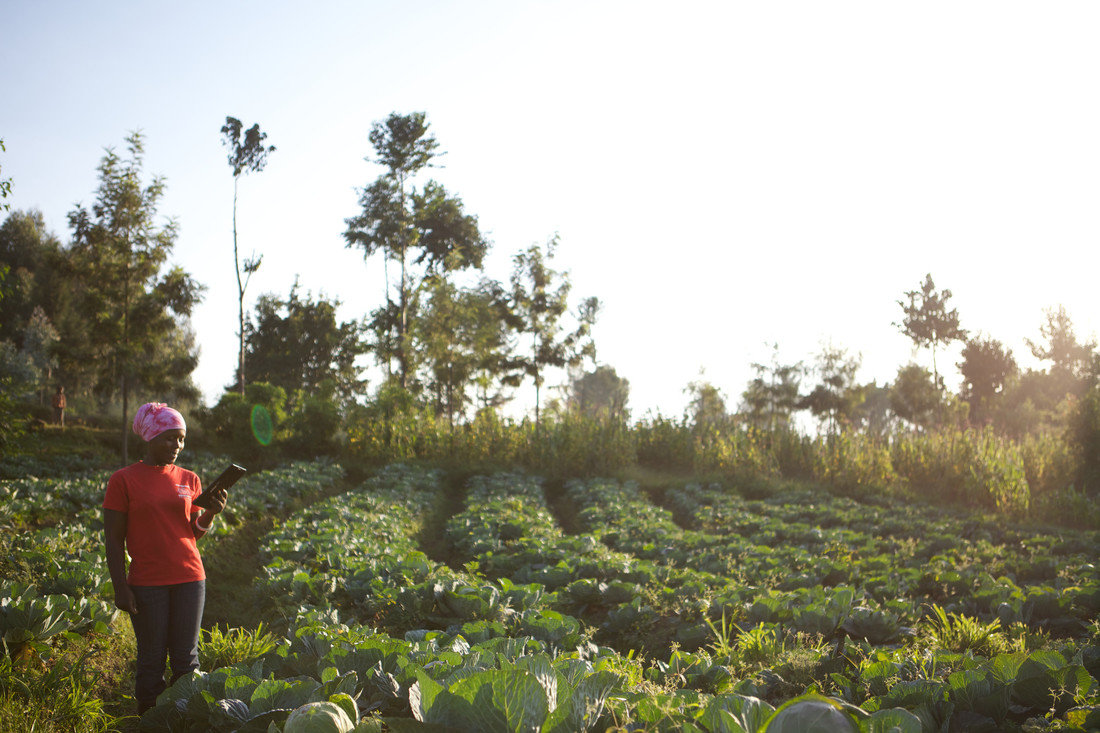
Accelerating Rural Access to Fintech
The Rise of the “Digital Farmer”
In almost all African countries there is a large unmet demand for access to credit and other financial services on the part of smallholder farmers, who, in most countries, represent the majority of the population. In fact, according to Dalberg Consulting, only two percent of the demand for credit among smallholder farmers is currently being met.
The rapid rise of smartphones, however, coupled with new entrants such as fintechs (financial technology firms) that are capitalizing on this new delivery channel to reach the poor, is providing new opportunities for groundbreaking innovation.
The MasterCard Foundation has initiated partnerships aimed at hastening the delivery of financial products and services to rural and remote communities in collaboration with a number of industry players, including fintechs. The AgriFin Accelerate program, established in 2015 with Mercy Corps, is one such partnership.

Photo by: Jennifer Huxta for The MasterCard Foundation
We launched the program first in Kenya where 39 percent of farmers in central and western parts of the country have access to an internet-enabled phone. This is fertile ground for AgriFin Accelerate to speed the delivery of bundled, digitally-enabled financial and informational services to smallholder farmers to help increase their production and grow their businesses.
Early indicators point to successful adoption of e-commerce and other transaction tools. Anecdotally, Cornelius Kiptoo, who grows oats, potatoes, maize, and vegetables, saw an increase in his farm’s overall revenue after being introduced to an online platform for selling his crops. He now reaches significantly more potential buyers by posting online advertisements on the platform.
This is just the beginning. Since it began operations, AgriFin Accelerate has uncovered as many as 125 sustainable fintech firms that have embraced the popularity of mobile money and aim to offer groundbreaking services to smallholder farmers.
A crucial component of partnerships like AgriFin Accelerate is to monitor any success in relieving farmers of the challenges they face with their businesses. A report from 2015 about the program confirmed the benefits of bundling agritech services to increase productivity among farmers in Kenya, mainly due to the nature of agricultural value chains. Offering a bundle of digital services allows for institutions to come together and develop multi-component solutions to common challenges farmers face, which makes it easier to integrate the technologies into their existing business models.
Another key takeaway from the early stages of the AgriFin Accelerate program is that farmers themselves must take an active role in the design and implementation of new technologies in order for those technologies to best address current challenges. This is increasingly true among more marginalized groups, such as women and youth.
Given the success of AgriFin Accelerate in Kenya, the Foundation and Mercy Corps recently launched the initiative in Tanzania. Nearly 80 percent of the country’s population depends on agriculture-related activities for their livelihoods, making it a prime location for financial institutions to offer agritech products and services.
Formal financial services among smallholder farmers in Tanzania are not yet widespread, as only 10 percent of the population have bank accounts in their name. Despite this, 75 percent are aware of mobile money and its benefits, demonstrating potential willingness to use technology to facilitate commerce. The goal of bringing the AgriFin Accelerate program to Tanzania is to implement fintech tools that can facilitate business growth.
Overall, partnerships like AgriFin Accelerate should help deliver tech-based solutions to sub-Saharan nations more quickly by providing funding to providers like fintechs that have a more nimble approach to innovation. Many of these smaller companies are experimenting with new models to serve the poor, and effectively working with more established providers such as banks and mobile phone companies to scale their solutions to the masses.
Some of those companies will present their business models at our upcoming Symposium on Financial Inclusion as they vie for the US$150,000 Clients at the Centre Prize. To learn more about the finalists for this year’s prize, go here and don’t forget to follow the conversation using #SoFI2016 on Twitter.
Olga Morawczynski is a Program Manager in the Financial Inclusion unit of The MasterCard Foundation.
This post is written in conjunction with our 2016 Symposium on Financial Inclusion in Kigali, Rwanda. Visit ushere to explore the 2016 event.


